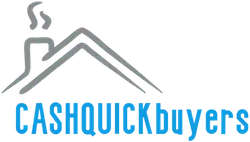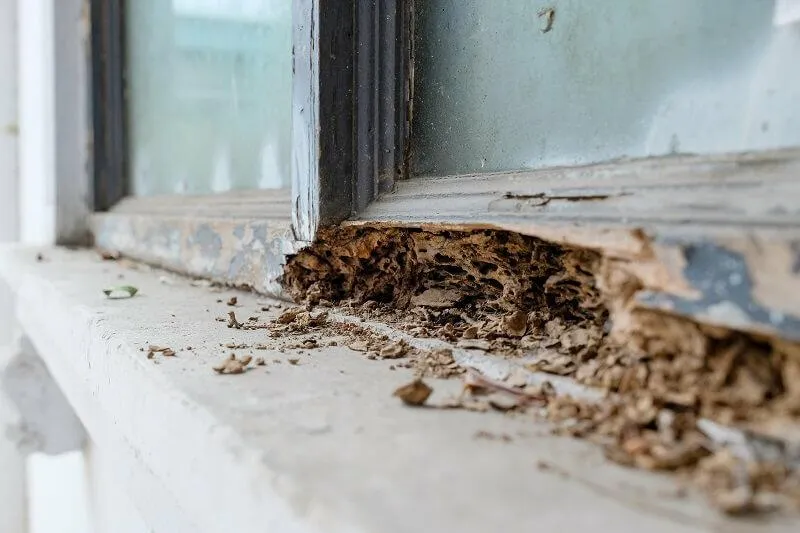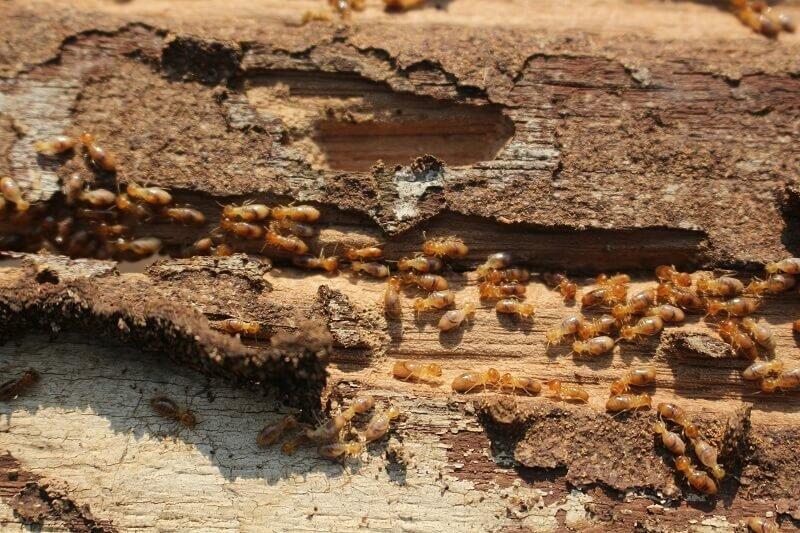
Call Us! (801) 845-3222
Selling a House With Termite Damage in Utah: A Guide for Home Sellers!
June 9, 2021
By muhammeds
A termite-infested home can pose more problems than just the obvious one.
What if, for instance, you’re looking to sell? Who in their right mind would want to buy a house with termite damage?
Selling a home that’s become a feeding ground for termites in Utah—or anywhere else, for that matter—is not the impossible task that it may seem. But it will require you to do your research.
More specifically, you’ll want to educate yourself on the types of termites you’re up against, how to send them packing, and how much it will cost to undo the damage they’ve done.

Types of Termites Found in Utah Homes
Pest control specialists estimate that termite activity negatively impacts both residential and commercial properties in around 75% of the great state of Utah. The two most common species of Utah termites are:
Subterranean termites – As their name suggests, these termites nest in the ground. When it’s time for them to feed, however, it’s not hard for them to find their way into houses and other buildings, particularly ones that are old or suffer from structural defects.
Drywood termites – Drywood termites spend their whole lives building colonies within wood surfaces. For this reason, they’re one of the biggest natural threats that homeowners face.
Removing the Termites in Your House
When it comes to evicting unwanted insect tenants, your best bet is always to call a reputable pest control service. This is especially true if you have reason to think that you may have a major infestation on your hands.
Termite control experts have the knowledge, tools, and experience needed to rid your home of termites without subjecting it to further damage.
To deal with subterranean termites, removers typically place termite bait systems in areas displaying evidence of infestation. Termite baits use specially-formulated insecticides to disrupt termites’ biological processes, and if deployed wisely can eventually result in the death of the entire colony.
Assuming dry wood termites are to blame, the pest control people will have no choice but to resort to a more drastic course of action: tented fumigation.
There are also a few simple steps you can take yourself to combat smaller infestations or prevent a swarm from getting any worse. These include:
Sealing cracks or gaps in your home’s exterior
Keeping mulch and wooden landscaping elements at least 15 inches away from your foundation
Storing firewood, scrap wood, and other materials that might be attractive to termites as far from your home as possible
Making sure that drainage water is routed away from your home
Checking all parts of your home regularly for signs of termite damage
Average Cost to Repair Termite Damage in Utah
The costs associated with repairing termite damage in Utah can vary depending on a few factors, such as the extent of the problem, the materials that need replacing, and the rates charged by the contractor you’re working with.
On average, however, you’re looking at around $250-300 per 8 hours of work for each individual structure affected.
Not bad when you consider that termites are responsible for roughly $5 billion in property damage nationwide each year.
By making a few prudent financial moves now, you can spare yourself the trouble of being confronted with much heftier expenses down the line. Think of it as an investment into the overall value of your home.
Repairing Your Termite Damaged Home
Once you’ve successfully banished a colony of termites from your home and gotten a ballpark quote for the necessary repairs, your next step will be to get underway with a fix and ensure that your home is structurally sound.
Fortunately, materials tend to be inexpensive, and if the destruction isn’t too severe, a skilled repair team should be able to make quick work of the project.
The contractor or carpenter you hire will start by going in and thoroughly surveying the damage. They’ll then decide whether to reinforce the existing wood or replace it outright.
The former strategy can be accomplished with the use of hardeners, wood fillers, and new fasteners and connecting pieces. If they deem replacement necessary, they’ll cut out all the dead and weakened wood they can find and install fresh-cut members in their place.
Documenting Repairs on Your House
If you intend to put your home on the market after winning the war against termites, being able to show proof of repairs is a must. That’s the case whether you plan on going through a traditional realtor, handling the transition yourself, or selling your house to a cash home buyer.
This sort of proof is available in the form of a “termite letter,” or a report provided by the pest control service detailing the nature and extent of the damage discovered in your home. Obtaining a termite letter will show interested parties that the domicile has recently been secured from termite-related perils and is therefore a safe investment.
While you’re at it, it’s a good idea to hold onto the invoice or receipt you received upon the completion of your repairs. Along with your termite letter, these documents can go a long way towards making prospective buyers feel confident in their purchase.
Getting a Termite Damage Warranty
At this point, you may be wondering whether it’s possible to insure your home against termite activity.
The answer is no—and yes.
Ordinary homeowners insurance almost never covers termite infestations and similar incidents, as insurers see it as the owner’s duty to keep up with regular maintenance and safeguard against potential devaluation risks.

That said, many pest control companies offer termite bonds, which are the exterminator’s equivalent of the kinds of warranties you might buy for appliances or electronics. If you shell out a termite bond, the removers will return to conduct regular inspections for the duration of your contract (usually 12-24 months) and will even carry out follow-up treatments as needed at no additional cost.
A termite bond essentially gives you coverage against future infestations. The only catch is that your home has to have been treated once already.
Getting Your House Inspected
The last thing you’ll want to do before listing your home is to contact a state-licensed home inspector and have them come out and perform a thorough appraisal.
While not a legal requirement, bringing in a home inspector will serve both your and your buyer’s interests, especially when selling a house by owner.
Not only will a walk-through supplement the information contained in your termite letter and repair documentation, but it will also give you an opportunity to address additional problem areas and issues that might otherwise go unnoticed.
Conclusion
Contending with termites in Utah as a homeowner doesn’t have to be a nightmare.
Even if you find out that it’s too late to save your home from a full-scale invasion, you still have options.
At Cash Quick Buyers, we buy homes in Utah that independent buyers might be reluctant to bid on—no repairs, no commissions, no hassle. Our team offers industry-leading cash payouts for houses in any condition and will always shoot straight with you about what we think your property is worth.
Best of all, you won’t be stuck waiting around for anyone to make good on the closing or financing obligations. Just request an offer, sign a few forms, and walk away with cash in hand. No other companies that buy houses in Park City, Salt Lake, Ogden, Logan, and other major metropolitan areas can make that promise.
If you’ve ever found yourself wondering, “How can I sell my house fast in Salt Lake City?”, Cash Quick Buyers is the safe, speedy solution you’ve been searching for.
So give us a call or visit us online today. We’re determined to make you one more satisfied customer.
Get More Info On Options To Sell Your Home...
Selling a property in today's market can be confusing. Connect with us or submit your info below and we'll help guide you through your options.
What Do You Have To Lose? Get Started Now and let us get started putting together your offer...
We buy houses in ANY CONDITION in Utah. There are no commissions or fees and no obligation whatsoever. Start below by giving us a bit of information about your property or call (801) 845-3222...
